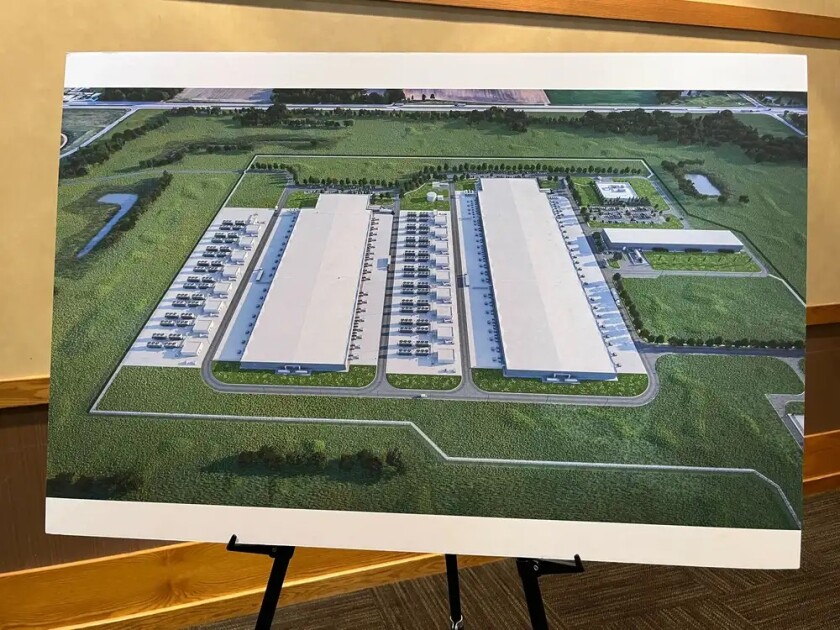BRAINERD ŌĆö Minnesota is one of several states where companies are building mega-scale data centers to keep up with the explosion of artificial intelligence and cloud computing.
Many data centers use water ŌĆö sometimes in large amounts ŌĆö to cool their equipment. ThatŌĆÖs raising some concerns about their impacts on the stateŌĆÖs groundwater supplies.
ADVERTISEMENT
A single large data center can use as much water as thousands of homes, or ŌĆ£equivalent to a city,ŌĆØ said Carrie Jennings, research and policy director at the nonprofit Freshwater.
ŌĆ£If you think about where weŌĆÖre already seeing depletions of groundwater or cones of depression, itŌĆÖs in those outer-ring suburbs that are getting away from the surface water source of the Mississippi or the Minnesota River,ŌĆØ she said. ŌĆ£TheyŌĆÖre exclusively using groundwater.ŌĆØ
Those are the same places where several large data centers are planned or under construction. But pinpointing the exact number of centers or how much water theyŌĆÖll use can be a challenge, even for state regulators.
ŌĆ£We hear about them in different ways, and thatŌĆÖs part of the challenge,ŌĆØ said Jason Moeckel, assistant director of the Minnesota Department of Natural ResourcesŌĆÖ ecological and water resources division.
While reviewing a project, local officials sometimes ask the DNR about any issues with a large water user coming to their city or county. But the details are often vague, Moeckel said.
ŌĆ£Oftentimes what weŌĆÖll hear is ŌĆśan industrial water user.ŌĆÖ They wonŌĆÖt even say if itŌĆÖs a data center,ŌĆØ he said.
Minnesota law requires a water-use permit for industries, farmers or anyone else who draws more than 1 million gallons a year. But some data centers get their water directly from a city system, bypassing the need for a state permit.
ADVERTISEMENT
A mid-sized data center consumes about 300,000 gallons of water a day, but that number can be much higher for hyperscale data centers.
Cities have water plans ensuring they have adequate water for future growth. Communities in the seven-county metro area also have comprehensive plans through the Metropolitan Council. But most were written before the recent explosion of large data centers.
Moeckel said when itŌĆÖs consulted about a project, the DNR can help cities identify potential red flags with a high-volume water user.
ŌĆ£There are pockets of places where we know there are some real challenges,ŌĆØ he said. ŌĆ£There are other places where weŌĆÖre beginning to get a picture of some of the challenges or the constraints.ŌĆØ
Some residents who live near proposed data centers also worry about their water use. Cathy Johnson lives near a large data center campus planned for Farmington and helped start the Coalition for Responsible Data Center Development.
ŌĆ£When water is taken out of one source at that rate, it will have an impact on the surrounding private wells,ŌĆØ she said.
Whether Minnesota has enough water to support data centers may depend on their design and how theyŌĆÖre cooled. Industry representatives say theyŌĆÖve gotten much more efficient and innovative in their design.
ADVERTISEMENT

Some tech companies have sustainability goals to save water and energy. TheyŌĆÖre building data centers with closed-loop systems that recirculate water to cool equipment. Others use air, wastewater or other fluids for cooling, saving high-quality groundwater for drinking. But those can add time and up-front expense to a project.
There are lots of opportunities for data centers to reduce water use, said Michelle Stockness, FreshwaterŌĆÖs executive director. But she said there needs to be more transparency when cities are approving big water users.
Stockness said some companies are eager to get their projects approved quickly. And they sometimes require local officials to sign non-disclosure agreements, limiting the information thatŌĆÖs available, she said.
ŌĆ£I wish we could help corporations lean into those goals more, with more options in the speed of which they need the decisions to be made,ŌĆØ Stockness said. ŌĆ£ThatŌĆÖs the tricky part.ŌĆØ
Some Minnesota lawmakers are calling for more regulations on data centers, although itŌĆÖs unclear whether they will pass this year.
State Sen. Bill Lieske, R-Lonsdale, represents a district that includes southern Dakota County, which is experiencing a data center boom. He authored a bill that restricts data centers larger than 800,000 square feet to industrial districts.
As a Republican, Lieske says he believes in local decision-making. But heŌĆÖs concerned local officials are sometimes wowed by the economic benefits of data centers, and donŌĆÖt consider the wider impacts.
ADVERTISEMENT
ŌĆ£All these towns, they think, ŌĆśOh, hey, itŌĆÖs not a big deal for my small town,ŌĆÖ ŌĆØ he said. ŌĆ£Yes. But if you draw that much water and electricity, itŌĆÖll affect the next small town over.ŌĆØ
LieskeŌĆÖs bill has bipartisan support. Sen. Erin Maye Quade, DFL-Apple Valley, is a co-author.
Maye Quade also introduced her own bill to fund a study of the environmental impacts of artificial intelligence, including data centers, which she calls a ŌĆ£downstream problem.ŌĆØ
ŌĆ£I think the real problem is upstream, with this rapid expansion of generative AI into our lives in some really insidious ways,ŌĆØ she said.
This story was originally published on MPRNews.org
______________________________________________________
This story was written by one of our partner news agencies. Forum Communications Company uses content from agencies such as Reuters, Kaiser Health News, Tribune News Service and others to provide a wider range of news to our readers. Learn more about the news services FCC uses here.











